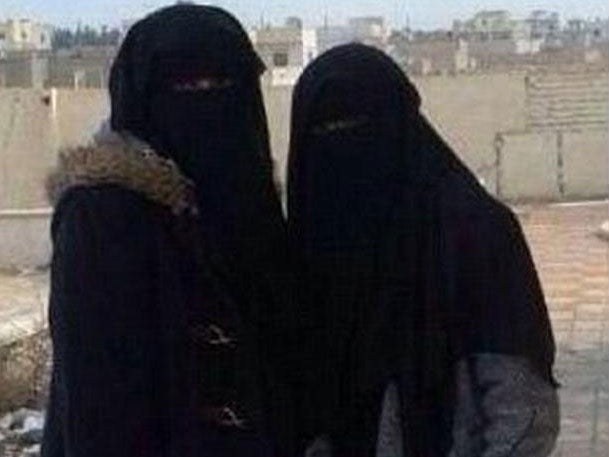Isis 'jihadi brides' trying to radicalise girls and encourage UK terror attacks online as they remain trapped in Syria
At least one British girl, Kadiza Sultana, is believed to have been killed in air strikes

Your support helps us to tell the story
From reproductive rights to climate change to Big Tech, The Independent is on the ground when the story is developing. Whether it's investigating the financials of Elon Musk's pro-Trump PAC or producing our latest documentary, 'The A Word', which shines a light on the American women fighting for reproductive rights, we know how important it is to parse out the facts from the messaging.
At such a critical moment in US history, we need reporters on the ground. Your donation allows us to keep sending journalists to speak to both sides of the story.
The Independent is trusted by Americans across the entire political spectrum. And unlike many other quality news outlets, we choose not to lock Americans out of our reporting and analysis with paywalls. We believe quality journalism should be available to everyone, paid for by those who can afford it.
Your support makes all the difference.Lured by the false promise of an Islamic utopia and an adoring husband, scores of British women and girls fled to join Isis, but as military operations against the group intensify they are now trapped with “zero chance” of escaping alive. At least one British recruit, 17-year-old Kadiza Sultana, is understood to have been killed in air strikes and the outlook for her two friends is bleak as Isis’ enemies advance on its ever-diminishing territories in Syria.
Her family said she quickly became disillusioned with life under the so-called Islamic State after arriving with Amira Abase and Shamima Begum early last year. The three friends fled from their homes in east London in the Easter holidays, sparking an international police search and emotional appeals from their families for them to return home.
But the trio swiftly reached Isis’ de-facto capital of Raqqa and were married to militants to take the role of dutiful wives and mothers proscribed by the group’s ideology. They were just three among at least 56 young women and girls known to have travelled from the UK to join Isis in Syria in 2015 alone.

Tasnime Akunjee, a solicitor for all three families, told The Independent Shamima and Amira were still alive. He told how Kadiza had become desperate to escape the group by late last year, discussing plans with her family but giving up hope when an Austrian jihadi bride was publicly beaten to death after being caught trying to flee.
“I don’t have a good feeling, I feel scared,” she told her sister in a phone call in November. “How am I going to get out?” Less than five months later she was reportedly killed in a Russian air strike.
“For me personally the hope is that if there is anything that can be salvaged from this tragic situation it is that people will take it as a warning,” Mr Akunjee said. “Unfortunately we are in this Playstation generation where people play war games and don’t take it seriously. But Syria is a war zone and people do get killed – my advice to anyone still out there would be to get out as fast as you can.”
But experts warn that it is almost impossible for women to leave Isis, with its interpretation of Sharia law meaning they cannot leave the house without a male guardian. While Turkey has closed its border along Isis territory, the terrorist group itself has launched a brutal crackdown on defectors, publicly executing anyone accused of trying to flee or attempting to smuggle people away.
Sara Khan, the co-founder of the counter-extremism Inspire group, told The Independent the chance of jihadi brides returning to the UK was “zero” once they are inside the group’s territory. “They quickly become disillusioned and realise that it’s not the utopia that it’s made out to be,” she added. “The reality is that for women and girls it’s incredibly difficult to leave Isis because of the control the group exerts on their movements.”
The role of women is strictly limited to that of mother and wife, with occasional exceptions for designated tasks as Sharia police and nurses. They are immediately married off to Isis fighters, being handed to a new husband upon the first’s death if they are lucky, or passed around as a “sexual present” if not. Clothing infractions are met with flogging, a lack of “meekness” with beating, alleged adultery or blasphemy with death.
Nikita Malik, a senior researcher from the Quilliam Foundation, told The Independent the violent reality is far from the rosy depiction given by Isis propaganda. Dabiq, Isis’ English language propaganda magazine, has contained several articles addressed to “our sisters” presenting life in its territories as a warped feminist ideal for Muslim woman free of the pressures of Western conformity.
“It’s more based in philosophy, about what it is to be a good person, a good wife, a good mother,” Ms Malik explained. “There is a sense of female empowerment, building the caliphate and being part of a sisterhood.” She said that many of the girls joining Isis may come from conservative Muslim communities where they expect an arranged marriage and feel they are asserting themselves by fleeing to Syria.
There are even rumours of a specialist dating website where budding jihadi brides can select a husband, Ms Malik said: “They view it as a romantic adventure, a journey where they have more of a choice and they are making an active decision to leave.”
Researchers for the Institute for Strategic Dialogue said that like their male counterparts, female Isis recruits often share feelings of isolation and conflicting identity, a sense of Muslim persecution and idealistic goals of a utopian “caliphate” where they can belong.
Isis' targeting of women is rare among terror groups, who normally aim to radicalise male fighters, but is crucial to its project to build a functioning "Islamic State" with successive generations moulded to its ideology.
In its annual report on terrorism in the European Union, Europol said that while the number of foreign citizens joining Isis was decreasing, women made up an increasingly “significant percentage”.

“An increasing proportion of women have travelled from some EU member states – for example from the UK, Belgium and, more markedly, the Netherlands,” the security agency said. “Women may also seek to radicalise others, take part in on and offline recruitment, and actively finance and facilitate terrorist groups and departure to them.”
That role is fostered by Isis, which allows foreign women internet access on the understanding they will use it contact “sisters” at home. “They only escape they get is online and they are given that access to have the opportunity to go and chat with other British women and radicalise them,” Ms Khan said.
Aqsa Mahmood, a former Scottish university student, has been put under international sanctions for her role as an online recruiter, with other female jihadists including Khadijah Dare and Sally-Anne Jones have called for terror attacks on social media and called on other women to follow them to Syria.
But increase in surveillance and counter-terror initiatives since the group’s lightning advance in 2014 has made it far more difficult for European recruits to swell Isis' ranks in Syria and Iraq.
With waning success on the battlefield and the loss of key strongholds, Isis has turned its attention from domestic operations to international terrorism – a change reflected in its messages to vulnerable young targets. “If you look at what Daesh propaganda is saying they are not encouraging people to travel anymore – instead they are encouraging attacks in the UK,” Ms Khan said. “We have seen communications where that is very much a concern…they need to be prevented from believing the propaganda, from believing the UK is their enemy.”
Join our commenting forum
Join thought-provoking conversations, follow other Independent readers and see their replies
Comments